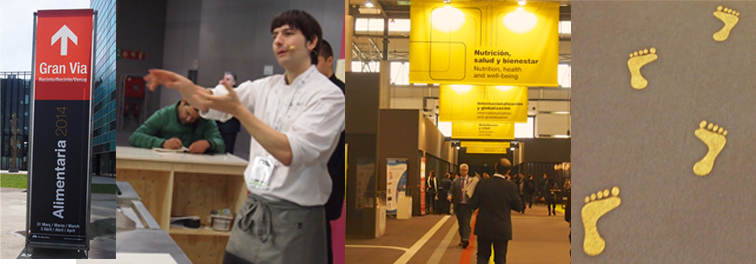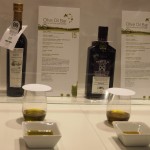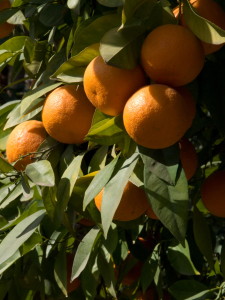
On the second day of the Alimentaria Food and Drinks Fair, I had to resist the temptation to continue food sampling and instead follow the yellow painted feet to The Hub, where the 10th International Mediterranean Diet Conference was taking place.
As followers of this blog will know, my fascination with food and lifestyle as a way of improving health, developed after experiencing the positive effects of altering my diet. By following the Mediterranean Diet and consuming more anti-inflammatory foods, such as Extra Virgin Olive Oil and Ginger, my osteoarthritis symptoms greatly improved. “You are what you eat” may sound like a tired old cliché, but I have become a firm advocate due to my own experiences. I was interested in hearing the latest news on the Diet.
Hosted by the Spanish Mediterranean Diet Foundation, the conference provides a platform for researchers to report on their latest findings.  The basis of this conference was that key Mediterranean ingredients, such as olive oil and garlic, have been proven to be effective powerhouses against disease, (when consumed within the context of a good quality diet of course!)
The basis of this conference was that key Mediterranean ingredients, such as olive oil and garlic, have been proven to be effective powerhouses against disease, (when consumed within the context of a good quality diet of course!)
Speakers emphasised how staying healthy can be easy and even enjoyable simply by including a rich variety of fruit, vegetables, nuts, seeds and wine in your regular diet.
The belief in the healing power of foods goes back a long way in history. Ancient societies relied on using herbs and other plants for medicinal purposes. But there is growing recognition of the important role that phytochemicals in plants can play on our own health. As a significant proportion of the Mediterranean Diet is made up of natural plant foods it is increasingly viewed as a model diet, which can:
- maintain or restore health,
- slow down ageing of the brain and body
- improve longevity.
Did you know that?
- Olive oil can cut strokes by 30% and diabetes by 40%?
- The Mediterranean Diet prevents cardiovascular disease better than a low-fat diet?
- A handful of nuts a day can help prevent heart disease?
- A diet rich in fruit and vegetables protects against most common forms of cancer?
- This diet can help prevent Alzheimers’ Disease?
- There is increasing evidence that following this diet can help combat stress?
Key points:
Dr Raymond Estruch, President of the Mediterranean Diet Foundation and Director of the PreDiMed study in Spain, described the Mediterranean Diet as:
• Seasonal fruits and vegetables, olives, nuts, pulses, seeds, dairy products
• Creative and imaginative
• Great recipes and knowledge
• Sustainable and made up of local products which are integral to the Mediterranean area.
 To enhance the cardio-protective elements of the Med Diet:
To enhance the cardio-protective elements of the Med Diet:
• Replace refined olive oil with Extra Virgin Olive Oil
• Eat local produce, preferably freshly harvested as produce grown in the open has more antioxidants than that grown in polytunnels.
• Eat organic, as it has more phytochemicals
• Eat more whole grain products
• Eat wild, oily fish
• Drink moderate amounts of wine with meals
• Eat nuts as they can help prevent illnesses
• Cut down on salt and take up exercise
Conference Take Home Message
- It is never too late to change your dietary habits-whatever your age. Phew! 🙂
(Please note: This post is in no way meant to be used as, or in place of, medical or nutritional advice and you should always consult a doctor or dietitian before embarking on any new diet or eating plan.)
For lots of easy Mediterranean style dishes, click on Recipes.


You must be logged in to post a comment.